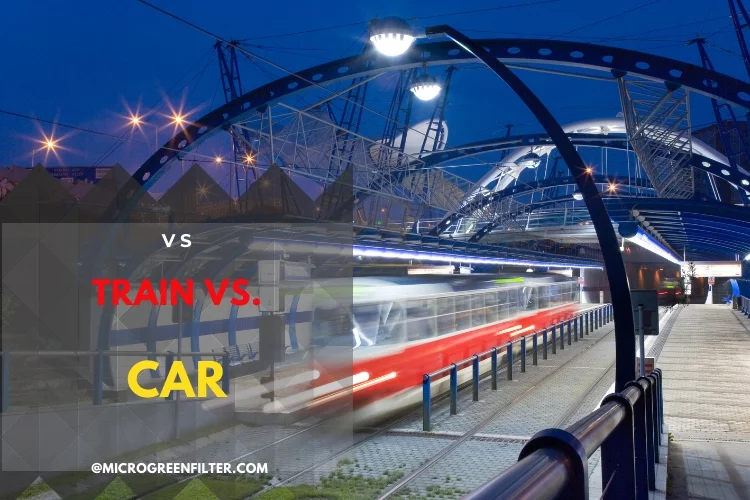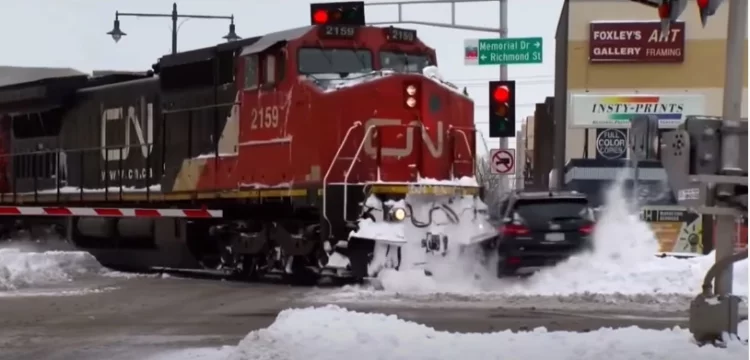Train Vs. Car
by Chris Lewis.
Train accidents are less common than typical car accidents, but they are worth discussing because of the potential for catastrophic consequences. Trains move with significant force due to their weight and the speed at which they normally travel. Due to the high momentum of trains when they crash with a car, they virtually invariably cause significant damage and often result in high casualties and deaths.
There's been a lot of talk lately about whether or not people should ditch their cars in favor of public transportation. But which is really better for the environment: taking the train or driving a car? Here's a closer look at the numbers.
Contents
- Different Parameters of Train vs Car
- How Common Are Train-Related Car Accidents?
- Why Do Train-Related Car Accidents Occur?
- Causes of Accidents
- Tips To Avoid Accidents
- Train Travel Is a Great Way to See the Countryside and Experience Different Cultures
- Train Travel Is More Environmentally Friendly Than Driving a Car
- Trains Are Often Cheaper Than Cars, Especially When Traveling Long Distances
- Trains Can Be More Comfortable and Luxurious Than Cars
- Trains Are a Great Way to Meet New People and Make Friends
- Conclusion for Car vs Train

Different Parameters of Train vs Car
At a glance,
- Train travel is a great way to see the countryside and experience different cultures
- Trains are often more comfortable and spacious than cars
- They're also more environmentally-friendly, as they emit less pollution
- Train travel can be expensive, but there are ways to save money on tickets
- It's also a great way to meet new people and make friends
- Trains can be delayed or cancelled, so always allow plenty of time for your journey
When you think of a railway vs. automobile accident, you usually think of a catastrophe, and with good reason: when a train and a car crash, the passengers in both vehicles might be gravely or fatally injured, and this is true. Normally, the driver and passengers of a vehicle can exit the vehicle before a collision occurs, however this is not always the case.

| Trains | Cars |
| Size | |
|
|
| Damage Potential | |
|
|
| Control | |
|
|
| Common Causes of Accident | |
|
|

These events include all forms of accidents, including pedestrian, automobile versus train, and other types of accidents that can occur due to equipment failures, but they do highlight the fact that nearly one train mishap occurs every week in our state, and the amount has been rising. In 2016, there were only 39 cases of public highway-rail crossings in our state, compared to 45 the following year. There are estimates that over 200 accidents involving a railway vehicle occurred in 2016, with seven of those accidents resulting in one or more fatalities.
How Common Are Train-Related Car Accidents?
Train accidents involving auto mobiles are infrequent, yet they happen more frequently than you may imagine.
There were 9,461 auto mobile/train crashes in 1981, the first year the Federal Rail road Administration began keeping track of these figures, with 728 fatalities and 3,293 injuries reported. These are staggering figures, yet as more and more safety safeguards are implemented, the number of collisions has steadily decreased over the last several decades.
So, while train vs. car collisions are rare, they do occur more frequently than most people assume. To emphasize the potential for catastrophic outcomes, a motorist is nearly 20 times more likely to die in a train collision than in a collision with another motor vehicle.
Why Do Train-Related Car Accidents Occur?
Most folks are probably curious as to how these kinds of mishaps occur. Train derailments are one of the most common causes of these accidents. Defective rail road tracks, conductor incompetence, train mechanical issues, and even incorrectly loaded cargo loads can all contribute to this.
An auto mobile being caught on the rails at a train crossing is another prevalent cause of these collisions. This usually can happen when a car stalls out or has a mechanical problem that leads it to break down. If you find yourself caught in such a situation, the first thing you must do is to get out of your car immediately and contact the local emergency services. You don't want to put your life on the line to save your car.
Causes of Accidents
Local Road Safety and/ or Railway Authorities usually conduct investigations to discover the specific cause of the collision. This activity is more difficult to accomplish than it appears, and it usually necessitates collaboration with state or federal government personnel. Some of the most common reasons of train vs. Auto mobile collisions:
- Breakdowns in equipment, such as weak brakes or improper safety equipment
- Rail roads that are defective and cause a train to derail
- A train conductor's human error, which could be due to weariness, intoxication, or just plain incompetence.
Your attorney will be able to decide who is liable for the accident and, as a result, who should be responsible for compensating you for your injuries and property damage by determining the cause of the accident.
Tips To Avoid Accidents
It is indeed sad to see sometimes how cars and human beings are crushed and killed by trains. News around the world testifies to the number of loss of lives by train every time.Is there no way out of this? How can we prevent Train vs. car accidents? Here I provide you some tips on how to prevent train accidents:-
1. Be Cautious When You Approach Crossings
Look and listen for any train approaching. Never you cross the tracks if there is one coming afar. Remember, your sense of Judgement may be wrong.
2. Stay Behind The Crossing Line
You must always stop your car at the train crossings. Keep well withing the painted line on the road if the train crossing has no gates.
3. No Traffic Violations
While at the train crossing take time to observe the signals. Many people disobey this and ended up being killed. You wouldn't like that, would you?
4. Be Patient
Allow the train to move away from you very well before crossing. There may be another train following the first one immediately. Not being patient enough could put you into danger by the second train.
5. Ask for Help
If your car while crossing the railway track develops a mechanical fault, the first thing is to move out of the vehicle as fast as possible to a safe distance. Thereafter, call the local police department so they can notify the railway company. Remember this. It takes a mile for a train to stop while travelling at a speed of 55 miles per hour.
Truly, it could be frustrating and annoying a times if you frequently had to wait for trains before you can continue on your way. But the fact still remains. Your life is worth more than a few minute of your time.
Train Travel Is a Great Way to See the Countryside and Experience Different Cultures
A lot of people think that traveling by train is less comfortable than traveling by car because the seats don't recline or flat, but this is not necessarily true. Some trains have really nice conditions and offer a great service to the passengers willing to make the trip. In fact, if you're not in a hurry and looking for a unique experience, train traveling can be even better than car travel.
Train travel allows you to see different landscapes, breath clean air and can be an overall pleasurable experience. The train trip between Bordeaux and Barcelona is considered to be the best in Europe, along with others like the Eurostar or TGV which are comfortable for passengers who need to bring their computers or work during the ride.
The biggest advantage of taking a train is that it allows you to experience the beauty of your destination without compromising your comfort. This means that you can travel through breathtaking landscapes and see things that are not accessible by car. If there is no direct road connecting two places, traveling by train is usually cheaper than taking a plane so if time isn't an issue, it is definitely worth considering.
Train Travel Is More Environmentally Friendly Than Driving a Car
Train travel is more environmentally friendly than driving a car, even when you take into consideration the emissions involved in producing electricity to run the trains.
The environmental benefits of train travel are significant considering that 1) it takes around two-thirds less energy to move one person by train than it does by car and 2) high speed rail produces 80 percent lower emissions than air travel.
Therefore, if you are in the business of making carbon footprints smaller, one good place to start is by shifting some trips from car to train. You can take this a step further and buy green electricity for your home. By doing so, you will be able to charge an electric vehicle with 100% clean energy-one of the single best things an individual can do to reduce their carbon footprint.
Trains Are Often Cheaper Than Cars, Especially When Traveling Long Distances
In general, trains are cheaper than traveling by car for long distances. This is partly because of train schedule flexibility and ticket costs as well as the amount of fuel required to run a car as compared to a train.
Train travel has been on a downward trend in terms of average price per mile since the 1960s.
In fact, trains have been getting cheaper, faster, and more efficient. Amongst the examples are that of the German ICE train being slightly cheaper than flying domestically within Germany or that of an Amtrak journey from New York to Los Angeles being significantly cheaper than flying.
Even high speed trains like China's CRH (China Railway High-speed) service come up to about half the price of flying for distances over 1,500 miles.
The biggest factor in train travel being cheaper than car travel is that trains can carry significantly more people at once compared to cars. This means that trains have a high occupancy rate which reduces costs per person whereas cars have low occupancy rates which makes it expensive per person.
Another big factor is the flexibility of train schedules. Many people don't realize it, but rail transportation has a better on-time performance than road or air transportation. This means that trains are more likely to be on time and thus less likely to miss scheduled connections with other forms of transport.
It's also important to remember that as fuel costs continue to rise, train fares will continue to drop.
Trains Can Be More Comfortable and Luxurious Than Cars
Trains have their own distinct advantages over buses when it comes to comfort and luxury. Trains are more comfortable than buses due to their enclosed compartments. They also have better amenities, such as entertainment systems and restrooms. These features not only make the journey pleasant but luxurious compared to riding with a large group of people in a bus.
Train transportation is eco-friendly in itself because it is powered by electricity, which creates less pollution than gas-powered cars. Since the 1970s, the number of trains using electricity to power their engines has increased exponentially in order to reduce pollution and greenhouse gas emissions. In fact, 40% of all rail lines run on strictly electric energy. Furthermore, a train can travel much further distances in one trip than a bus. The average distance between the stops of a train is approximately 40 to 80 miles, while the average distance between bus stops is only one mile. This reduces the amount of time that a traveler has to wait for a transit.
In addition, trains are safer than buses because they do not need to share the roads with other vehicles which increases crash risks. Because of this, trains reduce the number of traffic accidents. Trains are also easier to navigate than buses which can frequent different routes and stops depending on the time of day. This makes it possible to avoid large crowds, compared with buses that follow a less predictable schedule. Since there is no shortage in capacity for passengers or cargo, trains offer great flexibility when it comes to capacity planning. Trains can also accommodate a large number of passengers that would be impractical with buses, such as school children on field trips or large groups of tourists.
Trains Are a Great Way to Meet New People and Make Friends
We all love to travel, don't we? Even a trip from Point A to Point B is a chance for us to explore the world. If you want to get more of an adventure out of your travel experience, however, there's no better way than riding a train. Trains have been celebrated in literature and film since before the advent of moving pictures. Whenever people talk about great voyages, they're likely to mention the Orient Express or some other train that connects far-flung locations and lends itself well to storytelling.
You know what else has been celebrated in literature and film? Me! You, I mean. Not so sure about me personally, but stories about me and the good deeds I did for others have been around forever. And guess where most of them happened? That's right, on trains! Sure, some of them involved boats and planes too. But your chances of meeting new people or making friends while riding a train are much higher than they would be if you were to get on a plane or go for a cruise.
Conclusion for Car vs Train
To answer this question, consider these below points:
- The cost of owning and operating a car
- The cost of owning and operating a train
- Which is more affordable in the long run
- How much time you would save by taking the train instead of driving
- Which option is more environmentally friendly
So, what's the verdict? Is driving or flying better for vacation travel? In short, it depends. Driving can be more affordable and gives you more control over your schedule, but flying is often faster and more convenient. Ultimately, the best way to choose between driving and flying is to consider your specific needs and preferences. Thanks for reading!
 |
 |
 |
 |

About Chris Lewis.
Chris Lewis is a passionate individual with a deep affinity for the world of automobiles. From a tender age, his fascination with cars was nurtured by his father, a seasoned mechanic based in the vibrant city of San Francisco. Growing up under the watchful guidance of his skilled father, Chris developed an early aptitude for all things automotive.
Thoughts on "Train Vs. Car"
 |
 |
 |
 |
Get FREE Filters now. Or latest free tools from our best collections.
Disable Ad block to get all the secrets. Once done, hit any button below
 |
 |
 |
 |